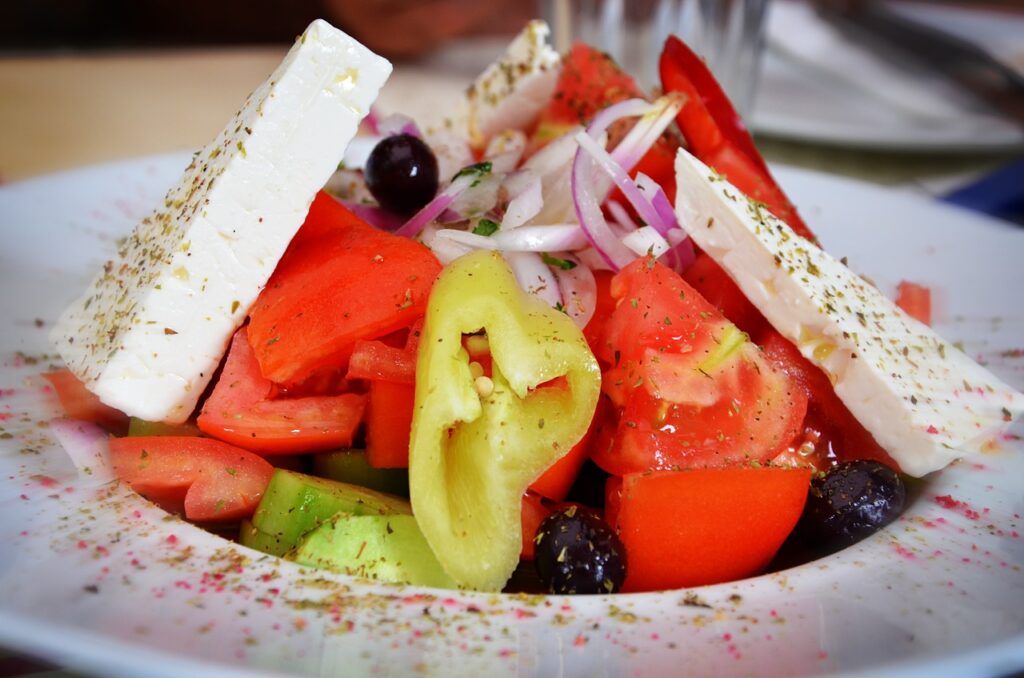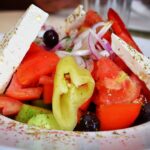Junk food has become the staple of snack food in American households since they were invented in the late 1800s and popularized in the post-WWII era; however, you can find an alternative in the form of the healthy snacks from the Mediterranean diet.
Apparently, the ultra sweet or salty flavors of these junk foods is very appealing to our taste buds, and in some cases, causes people to get addicted to their taste making them come back for more. But they are not invincible and, in fact, you can overcome that addictive urge to eat junk food by willpower alone! In order for you to do that, you would need a suitable replacement food and I highly recommend you try some of the healthy snacks from the Mediterranean diet. They’re delicious, highly nutritious and great for your health.
What Constitutes a Junk Food?
When can we consider food to be “junk” or unhealthy? Well, we’ve compiled a list of reasons below for you to see for yourself and determine whether it’s good for your well-being or not.
Junk food contains:
- High levels of saturated and trans fats
- Salt
- Processed sugars
- Unhealthy oils such as corn oil, canola (also called rapeseed) oil, cottonseed oil, soy oil, sunflower oil, safflower oil, grapeseed oil, and rice bran oil
- Zero nutrients
Examples of junk food:
- Cakes and biscuits
- Fast foods (such as hot chips, burgers and pizzas)
- Chocolate and sweets
- Processed meat (such as bacon)
- Snacks (such as chips)
- Sugary drinks (such as sports, energy and soft drinks)
- Alcoholic drinks
If your diet is high in fats, salt and sugar and is not receiving essential nutrients, your risk of obesity and other chronic (long-term) diseases may well increase.
These diseases include:
- Cardiovascular disease
- Type 2 diabetes
- Non-alcoholic fatty liver disease
- A number of cancers
Health Complications Caused by Eating Junk Food
You may have heard the saying, “moderation is the key?” Well, it’s worse for junk food if you consume it in large amounts, because it can have a negative effect on your general health and well-being and may reduce your ability to remain active. Being active is also the other face of the good health coin.
The short-term effects of eating junk food include:
- Increased stress levels
- Fatigue
- Difficulty sleeping
- Deceased energy levels
- Concentration difficulties
- Feeling down
- Tooth decay
In the long-term, eating junk food can lead to:
- Type 2 diabetes
- Heart problems (such as cardiovascular disease)
- Osteoporosis
- Obesity
- Certain cancers
- High blood pressure
- High cholesterol
- Depression
- Eating disorders
These chronic health problems are primarily caused by a diet that’s high in sugar, salt, trans and saturated fats, while lacking in essential nutrients such as fiber, vitamins and minerals like those found in healthy snacks from the Mediterranean diet.
How Do I Make Healthy Food Choices?
The first thing you’ll need to understand when making healthy food choices is learn the nutritional value of the food you are buying. You can start by reading the nutrition information on the back of all packaged items in the grocery store. Food labels can tell you things like the amount of energy (calories), protein, fat, carbohydrates, sugars, fiber and sodium in each product as well as the recommended serving size.
Be sure to also scrutinize a product’s nutritional value because sometimes they just put certain health claims in them such as ‘low in fat’ or ‘sugar free,’ even though their product is not really low in fat or has no sugars in them. Sometimes a product is labeled “light” or “lite,” which typically gives the consumer the impression that the product has less of the “bad stuff” in it, but in reality the manufacturers either just used a different form of sugar (glucose to fructose or maybe even sucralose) and advertised as something less impacting to your health. The important thing is to research the stuff they put in their products, so you won’t be consuming something that’s not good for your health.
You can do this, or you can just switch to an all-natural food products from your local farmer’s market. Those things have very little harmful chemicals in them with the worst being pesticides that you can easily rinse off from your faucet. Since they are mostly freshly harvested from a nearby farm, then you can be assured that 90% of the nutrients from these food sources remain in tact even after you’ve prepared them for serving. Of course, there are plentiful of healthy snacks from the Mediterranean diet that you can also replace with your daily snacks, which are often junk food.
Can I Include a Small Amount of Junk Food in a Healthy diet?
Yes, you can. According to various health experts and organizations you can include a small amount of junk or discretionary food into your diet. Even if you follow the Mediterranean diet, it does not exclude this food group, although it does caution you to avoid it whenever you can and only consume it in very small amounts. Treat junk food as pleasure food that you eat occasionally rather than as a big part of your diet.
Remember junk food mostly have high calorie content, so they could potentially make you gain unnecessary weight. In order to counter this, you must ensure to balance your junk food intake with increased exercise to help burn off extra energy. Alternatively, you can simply just replace unhealthy junk food for your tiny food for in-between meals with healthy snacks from the Mediterranean diet. They are so much better than those junk food you typically enjoy and even taste better too!
How Can I Reduce the Amount of Junk Food I Eat?
I understand that reducing amount or even giving up all of the junk food you consume can be quite the challenge, the Mediterranean diet does allow you to still enjoy your favorite junk foods. But if your ultimate goal is to maintain your overall health and physical well-being, then it would defeat the purpose of adhering to the Med diet if you’ll still keep some of the junk food in your fridge or cupboard.
Below are some helpful tips on how you can create healthy eating habits:
- Plan ahead of time on what you want to eat, so you can better decide what to eat for the day based on their nutritional value and not based on what’s left in your pantry. Another benefit of planning ahead is that it helps you spend on food appropriately and not go over your budget, plus since you’ve already planned on what to eat, you already know what to buy at the grocery store making shopping easier.
- Chose wholefood options such as wholemeal and wholegrain carbohydrates like pasta, bread and flour.
- Replace all your junk food for dessert with fresh fruits, in order to cut back from added salt, sugar and saturated fat.
- Select only the best foods with the highest nutritional content on their nutrition facts label, disregard the rest.
- Don’t fall for false advertising like ‘no added sugar,’ or ‘low fat,’ because the fact that they are soda or dairy make them basically contain carbonated sugar and are also high in fat.
- Find alternatives like healthy snacks from the Mediterranean diet. They’re delicious, nutritious and will make you feel full because of the high fiber they contain, but they won’t make you gain weight or produce any adverse health effects in your body.
Best Examples of Healthy Snacks from the Mediterranean Diet
Savory Greek Yogurt Bowl
Place 2-3 halved cherry tomatoes in a small bowl, sliced olives and a drizzle of olive oil and top it with 1/4 cup of plain Greek yogurt. This miracle food bowl will give you the health essential nutrients like protein from the Greek yogurt, healthy fats from the olive oil and fiber from the tomatoes. A very delicious and nutritious snack that you can substitute for cookies, or donuts.
Grapes and Cheese
Among the favorite combination in the Mediterranean cuisine are fruit and cheese. With exquisite paired flavors and the mixture of dietary fibers and proteins will make you feel full for hours and not make you crave for food, which keeps you from gaining weight. How about that?! A pleasure snack without the unwanted fats and unhealthy chemicals. These are the benefits you get from healthy snacks from the Mediterranean diet.
Walnuts and Dried Fruit
Both foods are loaded with nutrients! The walnut will give you protein as well as the heart-friendly omega-3 fatty acids, while dried fruits are a great source of dietary fiber and minerals. The Feta and Walnut Stuffed Dates is a good example of this snack.
Mediterranean Bean Dips with Carrot and Cucumber Sticks
Bean dips such as hummus are great ways to add fiber and protein to your snack. Throw carrot and cucumber sticks into the mix and you’ll have an appetizing and filling snack! A Beet and Walnut Hummus and this Lentil and Tahini Dip side dishes is where you need to start.
Tahini Toast with Feta and Pine Nuts
This snack requires whole grain bread (sliced) topped with tahini and mixed with a few drops of lemon plus additional toppings of crumbled feta and pine nuts. Another healthy snacks from the Mediterranean diet that has plenty of fiber, good fats and protein, which makes for a very filling snack. But tahini is not only rich in protein but other nutrients like vitamin E, iron, calcium and copper as well as antioxidant catalyst called lignans.
Recommended Reading: How to Live the Mediterranean Lifestyle in your Own Way
Bonus Content
Here are the 5 Best Mediterranean Side Dishes to Help you Manage your Weight After 50:
Veggie Sticks and Tzatziki Dip
When you mix yogurt, cucumber, and dill, you’ll get the delicious dip known as tzatziki. You can pair it with cherry tomatoes, firm cucumbers, carrots, or bell peppers. This makes a great movie or study group snack alternative in place of potato chips and is also highly nutritious.
Apple Slices & Tahini Drizzle
Use tahini in place of peanut butter, it’s made of sesame seeds, olive oil and spices. It’s about 10 times healthier than peanut butter and have an exquisite taste that goes well with apple slices.
Now as for apples, well, you already know that it keeps the doctor away, so we don’t need to stress about it. The point is that this snack is awesome!
Hummus
Hummus is a Middle Eastern dip, spread, or savory dish made from cooked, mashed chickpeas blended with tahini, lemon juice, and garlic. Typically hummus is paired with vegetables but you can also use it as a sandwich spread for sprouted whole grain bread. As you can see there are a lot of healthy snacks from the Mediterranean diet that you can use to replace junk food.
Mediterranean Eggplant Snacks
Eggplant is a staple food all over the Mediterranean Sea area and can be prepared in so many ways. Among the popular Mediterranean eggplant recipes include:
- Mediterranean grilled eggplant with whipped feta
- Mediterranean roasted eggplant
- Easy Greek style eggplant recipe
- Eggplant salad
- Mediterranean risotto
Honey Herb Walnuts
Walnuts are an excellent source of plant-based omega-3s and that’s why you should eat it as your afternoon snack. Stir-fry them for a few minutes in the skillet with a small amount of olive oil, then drizzle with honey. Keep cooking for a few minutes more and then serve.
Potatoes
Whether it’s the Mediterranean roasted potatoes, or the Greek lemon and garlic recipe that you’re preparing for your small meal or snack, you can always be sure that it’s delicious and nutritious. Potatoes are an excellent source of vitamin C and also provide potassium, protein and fiber. They go well with many recipes and side dishes plus they’ll help make you feel full but won’t make you fat. You’ll never go wrong when you choose to eat healthy snacks from the Mediterranean diet, instead of junk food.







